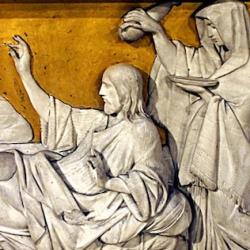At the beginning of Book 11 of Apuleius’s Golden Ass , Lucius returns to his human shape by prayer. As David Garland points out, the prayer is a good illustration of the kind of pagan prayers Jesus condemns in the sermon on the mount. In William Adlington’s 1556 translation, it reads:
“I found good hope and soveraigne remedy, though it were very late, to be delivered from all my misery, by invocation and prayer, to the excellent beauty of the Goddesse, whom I saw shining before mine eyes, wherefore shaking off mine Assie and drowsie sleepe, I arose with a joyfull face, and mooved by a great affection to purifie my selfe, I plunged my selfe seven times into the water of the Sea, which number of seven is conveniable and agreeable to holy and divine things, as the worthy and sage Philosopher Pythagoras hath declared. Then with a weeping countenance, I made this Orison to the puissant Goddesse, saying :
“O blessed Queene of heaven, whether thou be the Dame Ceres which art the originall and motherly nource of all fruitfull things in earth, who after the finding of thy daughter Proserpina, through the great joy which thou diddest presently conceive, madest barraine and unfruitfull ground to be plowed and sowne, and now thou inhabitest in the land of Eleusie;
“or whether thou be the celestiall Venus, who in the beginning of the world diddest couple together all kind of things with an ingendered love, by an eternall propagation of humane kind, art now worshipped within the Temples of the Ile Paphos,
“thou which art the sister of the God Phoebus, who nourishest so many people by the generation of beasts, and art now adored at the sacred places of Ephesus,
“thou which art horrible Proserpina, by reason of the deadly howlings which thou yeeldest, that hast power to stoppe and put away the invasion of the hags and Ghoasts which appeare unto men, and to keepe them downe in the closures of the earth : thou which art worshipped in divers manners, and doest illuminate all the borders of the earth by thy feminine shape, thou which nourishest all the fruits of the world by thy vigor and force; with whatsoever name or fashion it is lawfull to call upon thee, I pray thee, to end my great travaile and misery, and deliver mee from the wretched fortune, which had so long time pursued me.”
Garland notes that pagan prayers were “long on invocation and short on petition.”











